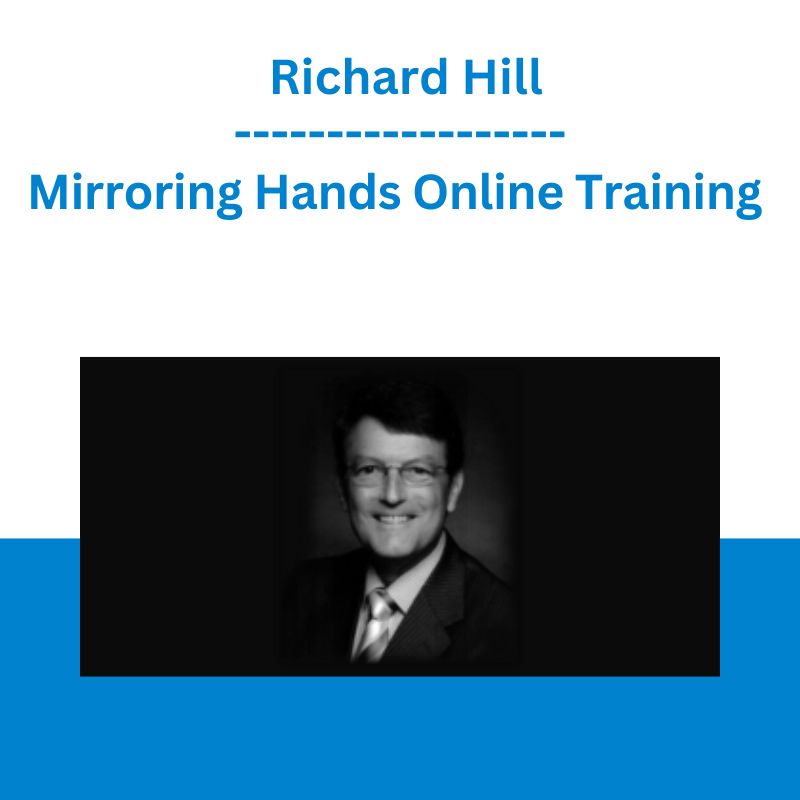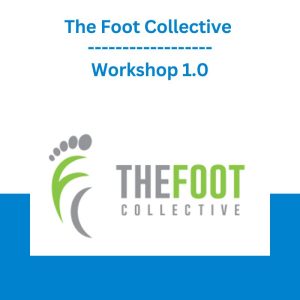*** Proof of Product ***

Exploring the Essential Features of “Mirroring Hands Online Training – Richard Hill”
This Foundations of Mirroring Hands for Psychotherapists and Hypnotherapists is the complete video introduction to Mirroring Hands by leading expert Richard Hill.
Course curriculum
Foundations of Mirroring Hands for Psychotherapists and Hypnotherapists
01. What is Mirroring Hands
What is Mirroring Hands (Part 1) (15 min)
What is Mirroring Hands (Part 2) (20 min)
02. Therapeutic Consiousness
Therapeutic Consiousness (17 min)
03. Induction
Induction (17 min)
04. Language Principles
Language Principles (37 min)
05. Basic Accessing Question
Basic Accessing Question (15 min)
06. Complex Systems
Complex Systems (Part 1) (40 min)
Complex Systems (Part 2) (26 min)
07. Demonstrations
Demonstrations (36 min)
08. Forms
Forms (20 min)
09. Natural Rhythms
Natural Rhythms (18 min)
10. Ultradian Rhythms
Ultradian Rhythms (15 min)
11. Sensitive Observation
Sensitive Observation (17 min)
12. Self Awareness
Self Awareness (15 min)
13. Guided Mirroring Hands
Guided Mirroring Hands (10 min)
14. Conclusion
Conclusion (5 min)
More resources for you
Before you go…
About This Course:
This program is of value to all mental health practitioners including lay practitioners and those seeking self-development. Mirroring Hands is a therapeutic practice that utilizes focused attention to create a state in the client where they are able to process both explicit and implicit experience simultaneously. The practice has emerged from the non-directive hypnotherapeutic style of Milton Erickson, that have been developed since Erickson’s death in 1980 by Ernest Rossi.
It is a rapid and gentle form of therapy where the client and the therapist are able to co-create a deep insight into what lies beneath the presenting problem. It is also an approach to therapy that can be applied to all modalities. Client-responsiveness is generated through language styles, a heightened sensitivity of observation and a curiosity for the meanings that can emerge spontaneously in response to our natural human capacity to recover from illness, be it physical and/or mental. The videos include numerous demonstrations and recordings from workshops. The program has a gentle balance of theory and practice.
It is important to understand the theoretical elements that are the foundation of effective therapy. We need to shift the standard way we think about how the mind works and how we can best create a beneficial therapeutic experience for the client. During the program you will learn how thinking in the context of a complex system gives you insights into not only how the Mirroring Hands process works, but also, more importantly, how clients are able to access their own resources and be a pro-active part of their own healing. You will also understand the value and importance of getting out of the client’s way as they find, with your help and facilitation, their own best resolution. In the workshop we are then to take the time to get a genuine “felt sense” of these technical concepts through a series of practical activities and exercises designed specifically for the workshops.
When you think about it, most of the therapies that we practice today can be found in the stories and theater of the past, back to Shakespeare and even to Plato and Socrates. There is much to discover in our natural human recovery system and this foundational course will both guide and, I hope, inspire you. This video program lays the foundation for the onsite workshop programs that are presented around the world. You will be informed about locations as they are organized. I hope to see you before too long in person. Meanwhile, this video program and, of course, the book, The Practitioner’s Guide to Mirroring Hands by myself and Ernest Rossi, provide a wonderful start to your engagement with Mirroring Hands.
Instructor
Chief Education Director
Richard Hill
Richard Hill has emerged from a diverse and fascinating journey to become an innovative speaker on the mind, brain and the human condition. From a satisfying, if not quite famous, early career in the creative arts, Richard returned to intellectual studies at 42 (1996) beginning with a Bachelor of Arts majoring in linguistics. This triggered a curiosity that led to a diploma in counselling and a new career in psychotherapy. Studying continued and he has added three Masters degrees – an MA in Social Ecology; an MEd in Social Ecology; and a Masters in Brain and Mind Sciences (MBMSc) from Sydney University. Richard is also fortunate to be mentored by the esteemed Ernest Rossi PhD who has invited Richard into the International Psychosocial Genomics Research Team to study the impact of therapeutic practice on the genetic level. His fascination with the disturbing problem of stress and anxiety has resulted in his unique theory – The Winner-Loser World Theory – and the positive positive counterpoint – The Curiosity Approach: which highlights our Curiosity for Possibility. These theories revolutionize the way we deal with stress and anxiety and how we approach standard therapeutic practices. Richard’s books include a collection of inspirational short stories in Choose Hope and his explication of his Winner/Loser World Theory in How the ‘real world’ Is Driving Us Crazy! In addition, he is published in various journals and magazines around the world and in book chapters, including Perspectives on Coping and Resilience and Strengths Based Social Work Practice in Mental Health, published worldwide. His latest book is co-authored with his mentor, Ernest Rossi, The Practitioner’s Guide to Mirroring Hands.
Please see the full list of alternative group-buy courses available here: https://lunacourse.com/shop/










 Ed Ponsi - Forex Trading
Ed Ponsi - Forex Trading  Toshko Raychev - Profit System + ITF Assistant
Toshko Raychev - Profit System + ITF Assistant  George Fontanills & Tom Gentile - Optionetics 6 DVD Series Home Study Course (Digital Download)
George Fontanills & Tom Gentile - Optionetics 6 DVD Series Home Study Course (Digital Download)  Emanuele Bonanni - My Trading Way
Emanuele Bonanni - My Trading Way  Julie Stoian & Cathy Olson - Launch Gorgeous - Funnel Gorgeous Bundle
Julie Stoian & Cathy Olson - Launch Gorgeous - Funnel Gorgeous Bundle  George Fontanills & Tom Gentile - Optionetics Wealth Without Worry Course
George Fontanills & Tom Gentile - Optionetics Wealth Without Worry Course  Erik Banks - Alternative Risk Transfer
Erik Banks - Alternative Risk Transfer  Fred Haug - Virtual Wholesaling Simplified
Fred Haug - Virtual Wholesaling Simplified  Team NFT Money - Ultimate NFT Playbook
Team NFT Money - Ultimate NFT Playbook  Dave Landry - Stock Selection Course
Dave Landry - Stock Selection Course  Alphashark - The AlphaShark SV-Scalper
Alphashark - The AlphaShark SV-Scalper  Greg Loehr - Advanced Option Trading With Broken Wing Butterflies
Greg Loehr - Advanced Option Trading With Broken Wing Butterflies  Simpler Trading - Bruce Marshall - The Options Defense Course
Simpler Trading - Bruce Marshall - The Options Defense Course  SMB - Options Training
SMB - Options Training  Jesse Livermore Trading System - Joe Marwood
Jesse Livermore Trading System - Joe Marwood  Advanced Treatment Considerations for Women with ADHD - Michelle Frank
Advanced Treatment Considerations for Women with ADHD - Michelle Frank  The Foot Collective - Workshop 1.0
The Foot Collective - Workshop 1.0  Sovereign Man Confidential - Renunciation Video
Sovereign Man Confidential - Renunciation Video  The Daily Traders – Exclusive Trading Mentorship Group
The Daily Traders – Exclusive Trading Mentorship Group  Matan Feldman - The 13-Week Cash Flow Modeling - Wall Street Prep
Matan Feldman - The 13-Week Cash Flow Modeling - Wall Street Prep  Crypto Dan - The Crypto Investing Blueprint To Financial Freedom By 2025
Crypto Dan - The Crypto Investing Blueprint To Financial Freedom By 2025  Money Miracle - George Angell - Use Other Peoples Money To Make You Rich
Money Miracle - George Angell - Use Other Peoples Money To Make You Rich